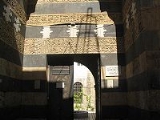
Az-Zahiriyah library
Encyclopedia
The Az-Zahiriyah library in Damascus, Syria dates back to 1277, taking its name from its founder Sultan
Baibars
(1223–1277). Building this library was his father’s idea but he died before he could achieve it. Initially Az-Zahiriah was a public school in charge of teaching Quranic sciences. The decorations, carvings, and writing on the building walls, in addition to the gate which bears geometric designs and patterns, make the library one of the most important buildings in Damascus.
The mosaics of the Umayyad Mosque
gave inspiration to the decoration of the main prayer hall where a band of lavish golden floral and architectural mosaics is running around.
The manuscript department includes over 13,000 classical Islamic manuscripts, the oldest being Imam Ahmad ibn Hanbal
’s Kitab al-zuhd and Kitab al-fada'il. Other notable manuscripits include Ta'rikh Dimashq by Ibn 'Asakir (1105–1175), al-Jam bayn al-gharibayn by Abu `Ubaydah Ahmad ibn Muhammad Al-Harawi (d. 1010), and Gharib al-hadith by Ibn Qutaybah al-Dinawari (d. 889).
The library
was nationally recognized by the Syrian state in 1880, and in 1949 a legal deposit law decreed that two copies of every work published in Syria be deposited in al-Zahiriyah National Library. The law was not enforced until July 1983, when a presidential decree required the deposit of 5 copies of each work published by a Syrian author in the Al-Assad Library. The Al-Assad Library became the National Library of Syria, replacing al-Zahiriyah Library.
Sultan Al-Zahir Baibars, also known as Rukn Uddin Baybrus (full name, al-Malik al-Zahir Rukn al-Din Baibars al-Bunduqdari) was buried in Damascus in 1277 under the dome of the Az-Zahiriyah library, established by him.
Sultan
Sultan is a title with several historical meanings. Originally, it was an Arabic language abstract noun meaning "strength", "authority", "rulership", and "dictatorship", derived from the masdar سلطة , meaning "authority" or "power". Later, it came to be used as the title of certain rulers who...
Baibars
Baibars
Baibars or Baybars , nicknamed Abu l-Futuh , was a Mamluk Sultan of Egypt. He was one of the commanders of the forces which inflicted a devastating defeat on the Seventh Crusade of King Louis IX of France and he led the vanguard of the Egyptian army at the Battle of Ain Jalut in 1260, which marked...
(1223–1277). Building this library was his father’s idea but he died before he could achieve it. Initially Az-Zahiriah was a public school in charge of teaching Quranic sciences. The decorations, carvings, and writing on the building walls, in addition to the gate which bears geometric designs and patterns, make the library one of the most important buildings in Damascus.
The mosaics of the Umayyad Mosque
Umayyad Mosque
The Umayyad Mosque, also known as the Great Mosque of Damascus or formerly the Basilica of Saint John the Baptist , is located in the old city of Damascus, is one of the largest and oldest mosques in the world...
gave inspiration to the decoration of the main prayer hall where a band of lavish golden floral and architectural mosaics is running around.
The manuscript department includes over 13,000 classical Islamic manuscripts, the oldest being Imam Ahmad ibn Hanbal
Ahmad ibn Hanbal
Ahmad bin Muhammad bin Hanbal Abu `Abd Allah al-Shaybani was an important Muslim scholar and theologian. He is considered the founder of the Hanbali school of fiqh...
’s Kitab al-zuhd and Kitab al-fada'il. Other notable manuscripits include Ta'rikh Dimashq by Ibn 'Asakir (1105–1175), al-Jam bayn al-gharibayn by Abu `Ubaydah Ahmad ibn Muhammad Al-Harawi (d. 1010), and Gharib al-hadith by Ibn Qutaybah al-Dinawari (d. 889).
The library
Library
In a traditional sense, a library is a large collection of books, and can refer to the place in which the collection is housed. Today, the term can refer to any collection, including digital sources, resources, and services...
was nationally recognized by the Syrian state in 1880, and in 1949 a legal deposit law decreed that two copies of every work published in Syria be deposited in al-Zahiriyah National Library. The law was not enforced until July 1983, when a presidential decree required the deposit of 5 copies of each work published by a Syrian author in the Al-Assad Library. The Al-Assad Library became the National Library of Syria, replacing al-Zahiriyah Library.
Sultan Al-Zahir Baibars, also known as Rukn Uddin Baybrus (full name, al-Malik al-Zahir Rukn al-Din Baibars al-Bunduqdari) was buried in Damascus in 1277 under the dome of the Az-Zahiriyah library, established by him.

